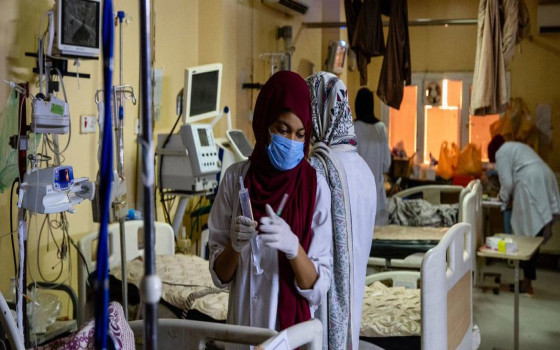
Aid restrictions and attacks on hospitals threaten the lives of millions in Gaza and Sudan

- Europe and Arabs
- Thursday , 18 July 2024 12:22 PM GMT
Cairo - Gaza - Khartoum: Europe and the Arabs
Dr. Hanan Balkhi, WHO Regional Director for the Eastern Mediterranean, warned of the worsening humanitarian crisis in Gaza and Sudan due to restrictions on humanitarian access and severe shortages of medical supplies and fuel, leading to disease outbreaks and high death rates. According to what was stated in the United Nations daily news bulletin, a copy of which we received on Thursday morning
During a press briefing from Cairo, yesterday, Wednesday, Balkhi stressed the necessity of opening all border crossings to ensure the continuous flow of aid, pointing to four main challenges that she said were facing the organization’s response to humanitarian emergencies in the Eastern Mediterranean region.
These challenges include: restrictions on access for aid and humanitarian workers, frequent attacks on healthcare facilities, disease outbreak prevention and response, and the risk that reduced donor funding will lead to a real and tragic human cost.
The situation in Gaza
In Gaza, Dr. Balkhi said that functioning health facilities and ambulances are suffering from a massive shortage of fuel and supplies in light of the recent Israeli evacuation orders and the continuation of hostilities, noting that during the past month “only sixteen World Health Organization trucks were allowed to enter Gaza through the Karm crossing.” Abu Salem, the transfer of aid to Gaza continues to face many obstacles due to the continuation of hostilities, damaged and destroyed roads, insecurity, and restrictions on the entry of trucks.”
She said that forty-four World Health Organization trucks were standing in Al-Arish, Egypt, loaded with health supplies, and forty trucks in Ismailia waiting for the Rafah crossing to open for entry, in addition to trucks belonging to other humanitarian agencies.
In this regard, Dr. Balkhi stressed that the immediate priority should be to open the Rafah crossing in the long term to ensure the wide and unrestricted flow of much-needed aid and the arrival of aid without restrictions or obstacles through all available roads and crossings.
She explained that the organization’s employees and partners in Gaza are still facing major challenges in accessing health facilities, as well as aid convoys whose movement has been restricted or prevented from reaching their destination. She went on to say:
“Health and relief workers suffer the most as they try to treat patients with scarce resources, which has led to infection of wounds, amputations, and even deaths that could have been avoided if the necessary medical resources for treatment were available. This is evidenced by the rejection of requests submitted.” By allowing the entry of missions to provide medical supplies to Al-Ahli Hospital and the Patient’s Friends Hospital.”
Sudan is not better off
The situation in Sudan is no different from Gaza, according to Dr. Hanan Balkhi, noting that people in Darfur, Kordofan, Khartoum and Al-Jazira are effectively deprived of humanitarian aid, especially in Darfur. She said that more than eight hundred thousand people are deprived of access to food, health care and medical supplies.
She explained that the organization sent a high-level mission of experts to Chad with the aim of assessing the health needs of refugees and the communities hosting them, and also to improve and expand the scope of cross-border operations to reach the states of Darfur affected by the conflict, especially the delivery of urgent medical supplies.
She said that the organization, as part of its cross-border operations, succeeded in delivering medical supplies to North Darfur at the beginning of this week, noting that this aid meets some of the health needs of more than two hundred thousand people, “and there is still an urgent need to expand the process of delivering supplies to these areas." The call was renewed to open the Adre crossing between Chad and Darfur as “the most reliable crossing” when other roads are out of service during the rainy season.
Repeated attacks on health care facilities
In this regard, Dr. Hanan Balkhi reported that more than a thousand attacks on health facilities in the occupied Palestinian territory have been reported since the seventh of last October.
As for Sudan, the organization has verified that eighty-two attacks have occurred on health care facilities since the beginning of hostilities in April 2023, noting that the last six weeks alone have witnessed seventeen attacks on these facilities.
In this context, she reiterated what the World Health Organization has always called for, that the protection of health care is “a non-negotiable matter stipulated by international humanitarian law, which does not exclude any member state from its obligation.”
Disease outbreaks
Dr. Hanan Balkhi also warned of the spread of infectious diseases in Gaza, Sudan, Somalia and Yemen due to the lack of clean water and sanitation services, and called for increased investments in the field of disease prevention and control.
Finally, Balkhi warned that the decrease in funding provided by donors is leading to the closure of hospitals and health centers in Afghanistan, Somalia and Syria, threatening the lives of millions of people. She called for increasing financial support for the health sector in these countries to ensure the continued provision of basic services.












No Comments Found